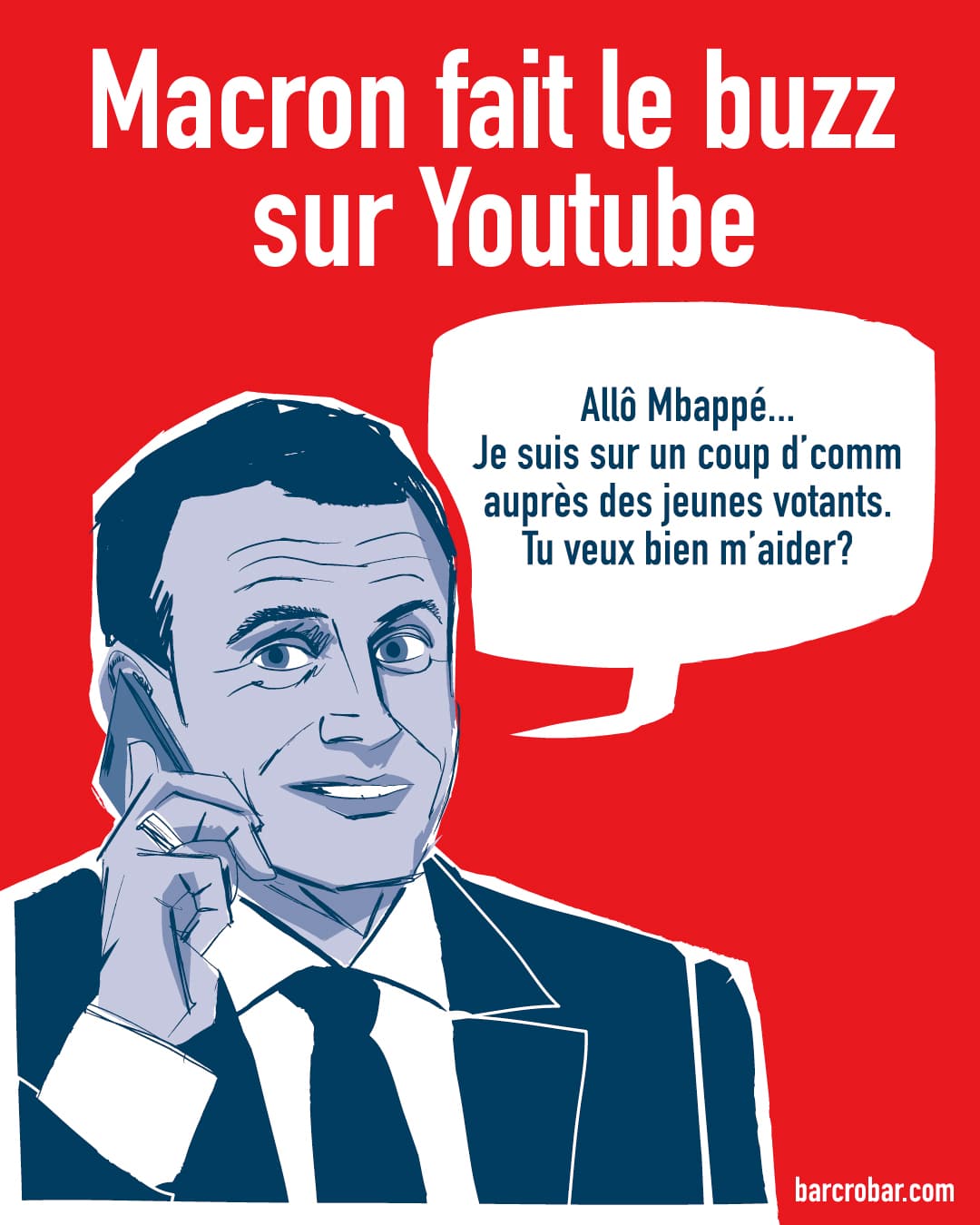McFly and Carlito have over 6 million subscribers on YouTube, undeniable comedic talent and perhaps the best intentions in the world. But when they say that making a video with Emmanuel Macron isn't the same as helping him get re-elected, they're wrong.
It's 19 February 2021, and McFly and Carlito are posting a video on their YouTube channel: "The PRESIDENT OF THE REPUBLIC has issued us with a challenge. Crazy? Yes." The codes of the "Youtube Game" are respected, with the two youtubers commenting and going back over the phone call they received earlier from the President, and the challenge he gave them: to make a video on barrier gestures that exceeds 10 million views. If they succeed, they will be invited to the Elysée Palace to shoot a new video, giving them the opportunity to create new content and the promise of several million more views. The challenge was met in three days: by midday on Wednesday, the video already had 11 million views. A look back at an election propaganda campaign aimed at 15-25 year-olds, disguised behind a harmless video on barrier gestures.
Macron in search of the Halo effect
To understand Emmanuel Macron's objective behind this challenge to two young youtuber stars, icons of a generation, we first need to understand how a cognitive bias works: the Halo effect. The Halo effect causes you to make unconscious associations of ideas, and to transfer the qualities of a person or object to the person or object associated with it.
For decades, this bias has been the basis of a plethora of advertising campaigns in which brands associate the image of a sportsperson or celebrity with their products, hoping that, through a halo effect, their image will 'rub off' on their product. Among the 15-25 age group, McFly and Carlito are icons of cool. Their videos, viewed millions of times, promise their subscribers a funny time, something to smile about and clear their heads. In short, a cool moment. In other words, by this simple halo effect, if McFly and Carlito make a video with Emmanuel Macron, it automatically makes Emmanuel Macron cool.
No matter what is said, and no matter what the subject, our brains will make the unconscious association between their personalities and the image of Emmanuel Macron.
Image and personality, decisive factors for 2022?
In a democracy, we like to believe that when people go to the polls, they are voting in good conscience for a programme, for ideas, for a vision of the future. In reality, we know that this is not true. All the more so with someone like Emmanuel Macron. According to an Ipsos-Sopra Steria poll, in 2017, 8 % of votes for Emmanuel Macron in the second round were for "his personality. 8 %, compared with his score in the first round, represents around 700,000 votes. And yet an unsuccessful candidate has been saying for three and a half years that in 2017 he would have been in the second round. "à 600 000 votes". That candidate is Jean-Luc Mélenchon.
Since 2017, young people (born between around 1998 and 2005) have been the target of numerous reforms that have made their living conditions more difficult and their future more uncertain. With Parcoursup and the reform of the lycée, their chances of accessing a good education have been reduced, and have widened the inequalities between young people from favoured city centres, and the others (suburbs and "provinces"). Emmanuel Macron has also failed to live up to the expectations of this generation when it comes to the climate, as evidenced by his failure to respect the Paris agreements and his backtracking/amendments on neonicotinoids, glyphosate and the ban on disposable plastic.
The issue of police violence is also at the heart of the concerns of part of this generation, as demonstrated by the huge success of the demonstration on 2 June outside the Paris Magistrates' Court in memory of Adama Traoré and George Floyd. It is also a marker of the break with a President who makes no secret of his support for the methods of the Paris Police Prefect, Didier Lallement. Above all, these young people are starving and desperate. Between the exponential increase in prostitution, whether physical or digital, and the daily lengthening of queues outside food aid centres, we can see that an entire generation has been abandoned in the midst of a health crisis.
Faced with this situation, it is perfectly reasonable to think that the executive has commissioned surveys to gauge how this generation feels about its actions. And it is just as reasonable to think that the results of these polls are not good, hence the need to use influencers to limit the damage done by politics through communication.
Using influence to get round the rules
What is happening between McFly and Carlito and Emmanuel Macron is not a first under the LREM presidency, as this executive has already used it on several occasions to deliver messages to a population far removed from traditional media. Whether it's fitness youtuber Tibo InShape to promote the SNU, influencer EnjoyPhoenix who was invited to spend a day with Brune Poirson, then Secretary of State for Ecology, to green the government's image, or Nino Arial as part of an anti-harassment campaign, the use of influencers has become common practice under Emmanuel Macron's five-year presidency.
And this practice raises many questions.
With an audience of several million followers and the halo effect they confer on the politicians with whom they collaborate, influencers are a powerful means of political propaganda among the under-30s. But they are also a way for politicians to get round the French ban on advertising on social networks. In France, the legislation governing advertising for political propaganda purposes is particularly strict: it is prohibited in the six months preceding an election.
No banners, no keyword purchases, no sponsored posts on Facebook or Instagram, nothing. But as it stands, legislation does not prohibit commissioning a video from an influencer. However, given the young age of their audience (often underage) and the fact that an influencer is not bound by any duty of neutrality, unlike a journalist, we need to think about how, at the very least, to regulate and legislate these practices, which represent a real risk to the integrity of future elections.
by Antoine Kalawski, Liberation.fr

